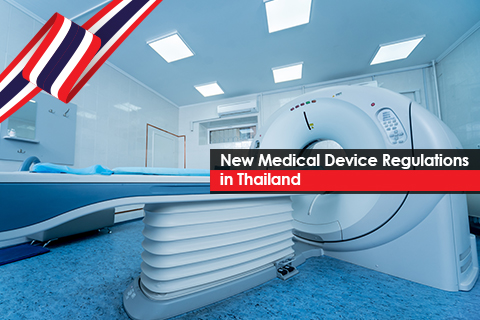
The Thai Food and Drug Administration (TFDA) has revised its medical device regulations to ensure the safety and effectiveness of the devices marketed in Thailand and to harmonize the regulations with the other ASEAN countries. There have been changes in the medical device classification, registration pathways and process, timelines and fees. The new regulations, which are more rigorous, came into force from February 2021 and are applicable to both medical devices and In-Vitro Diagnostic devices (IVDs). These new regulations increase the Regulatory burden to most manufacturers as most devices requiring listing earlier now need to be either notified or licensed.
Classification and Grouping of Medical Devices
Before the amendment, the medical devices were categorized into three (03) risk classes and few medical devices falling under high-risk Class I were subjected to the registration process. A four-tiered risk classification system has been introduced in the new regulations, aligning with the ASEAN Medical Device Directives (AMDD). In contrast to the repelled regulations, the risk increases from Class I devices through Class IV devices.
The revised regulations allow the medical devices and IVDs to be grouped into Single, System, Family, Set, IVD Test Kit and IVD Cluster categories. The devices and IVDs should comply with the three (03) new grouping rules, i.e. shall have one generic proprietary name, product name and common intended purpose.
|
|
Grouping Rules |
Features of the Device Category |
|
Single |
comply |
|
|
System |
comply |
|
|
Family |
comply |
|
|
Set |
comply |
|
|
IVD Test Kit |
comply |
|
|
IVD Cluster |
comply |
|
The Registration Process for Medical Devices:
According to the new regulations, device registration involves two (02) stages: pre-submission and e-submission.
- In the pre-submission stage, applicants must submit the information in the pre-submission system for risk classification and device grouping.
- In the e-submission stage, applicants must submit partial or complete relevant documentation for product registration.
Based on the classification and grouping outcome from the pre-submission stage, the manufacturer must decide the applicable Regulatory pathway. The Class I devices should be listed; Class II and III devices should be Notified; and Class IV devices must have licenses in place before they are placed in the Thailand market.
Documentation requirements
The listing process of Class I devices requires the applicant to submit Import License Establishment, Authorization Letter, device documents like device label, user manual and current registration status of a device in other countries.
The products that fall under Class II, III and IV must have all the technical data per the Common Submission Dossier Template (CSDT) format. They shall cover all elements defined in the AMDD, i.e., executive summary, essential principles and methods used to demonstrate conformity, device description, a summary of design verification and validation, preclinical and clinical data, device labeling and risk analysis and manufacturer information.
The Certificates of Free Sale (CFS) are no longer required for registration process. Earlier, the license was valid only till the validity of CFS. This update can be considered a boon for the device manufacturers from countries where the CFS is valid for a very short time period (E.g., China, where the CFS is valid only for two (02) years).
The new regulation requires all home use medical devices to have labeling in the Thai language from October 31, 2021. English labeling is acceptable for professional use medical devices.
Transition Timelines for the New Thailand
The registration requirements of the device vary with the Class of device. The low-risk Class I devices must be listed before they are imported and marketed in Thailand, whereas the Class II and Class III devices have to be notified and the Class IV devices must have an approved license to place them in the Thai market. The Class II, III and IV devices require submission of technical dossier, as per the ASEAN CSDT format. The Class I Sterile and measuring devices require submission of testing reports for placing these devices in the market.
All devices registered after February 15, 2021, shall comply with the new regulations and have their technical files compiled in CSDT format. One shall renew the devices currently approved under the old regulations as per the new regulations. These devices, however, have a grace period based on the expiry of existing TFDA approvals. The Class II, III and IV devices with their certificates due for expiry within one (01) year from the date of announcement shall be renewed by February 15, 2022. Referred to as partial I, this partial renewal requires less documentation and renewed import license would be valid for three (03) years. The Class II, III and IV devices due for expiry after a year from the date of the announcement, i.e., in 2022 and beyond, can submit the applications within three (03) years and require most of the CSDT documents to be submitted. Referred to as partial II, the import licenses renewed under this will be valid for five (05) years. Once these renewed import licenses are expired, a complete submission is required.
With the change in the device regulations, the Thai FDA is now on par with the ASEAN MDD guidance for the classification of medical devices. The new regulations have made the device registration process in Thailand complicated with longer approval timelines, higher Agency fees and extensive documentation requirements. As the device licenses are not transferrable, the manufacturers shall ensure that they appoint an independent, reliable and experienced Regulatory partner to meet their long-term business goals for the Thailand market.
To know comprehensive insights on Thai Agent requirements, transition to new regulations and device registration in Thailand, contact a proven Regulatory expert. Stay informed. Stay compliant.
